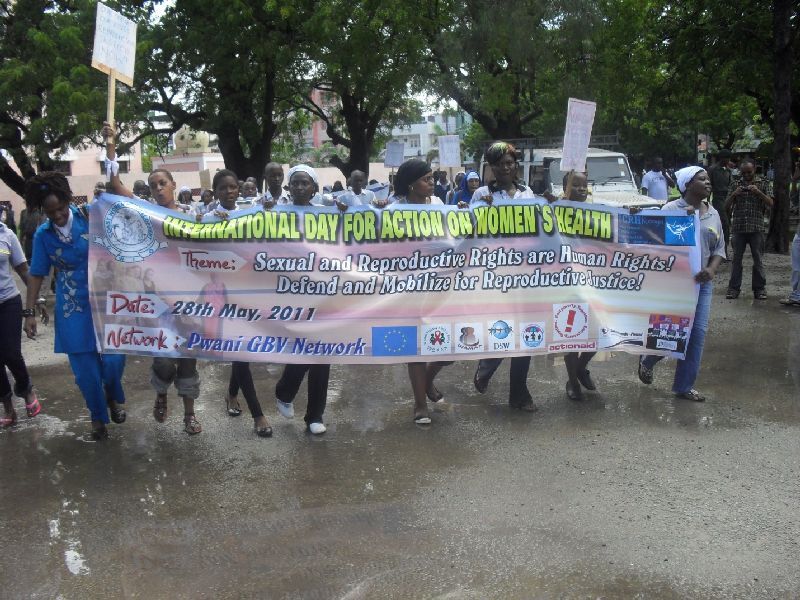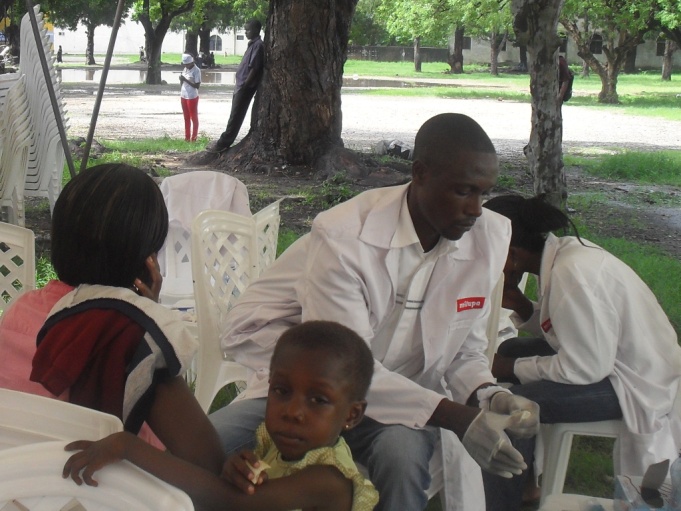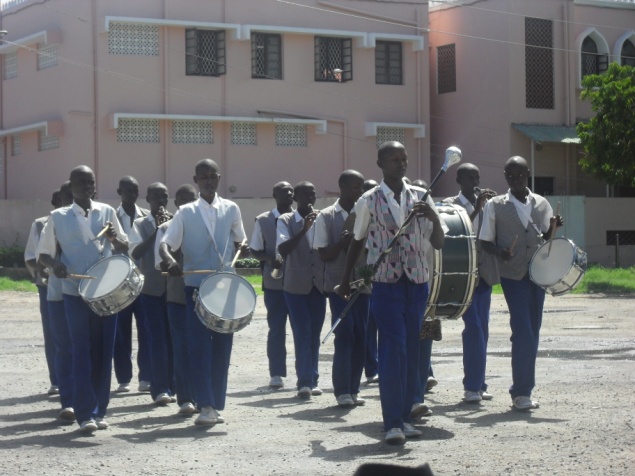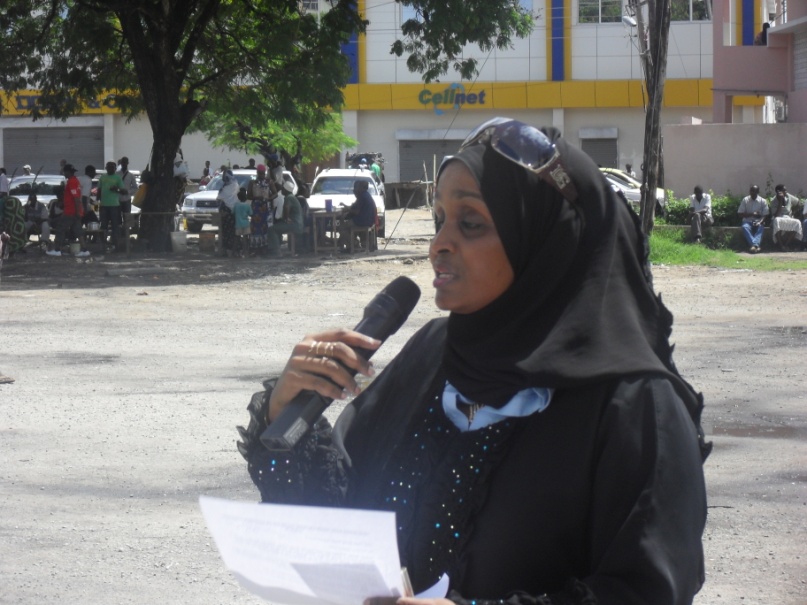COAST WOMEN IN DEVELOPMENT
Report for International Day for Action on Women’s Health – 28th May 2011
Makadara Grounds, Mombasa

Introduction
International Day for Action on Women’s Health is usually celebrated annually. The origins of this world health date emanate from a 1987 meeting of the Women’s Global Network for Reproductive Right (WGNRR), where the Latin American and Caribbean Women’s Health Network proposed the creation of a global day of action for women’s health. Today more than 25 countries in Africa and several other countries all over the world use this day to advocate for the better health of women and children all over the world.
Maternal mortality, infant mortality, HIV/AIDS and Sexual Gender Based Violence are major setbacks to the health of Women in the Kenyan Coast specifically Mombasa County today. Pwani GBV network and Coast Health Action Campaign Network have been dealing with the issues since 2008.
This year, the two networks expected to prompt an initiative of Health Action Campaign to ensure that every woman in Kenya gets what is rightfully hers- with an aim of advocating the right to health as the framework government is supposed to develop, implement and fund health programs. The right to health is also a means of holding the government accountable for its MDGs 4, 5 and 6 and the international obligations in respect to Human rights.
The state of Women’s Health in Kenya Today
There are concerns over rising reports of deteriorating standards of reproductive health care in government hospitals, clinics and health centers as well as in private hospitals and institutions. The state of health care centers at the Coast is wanting and the region is in dire need of proper health care facilities, workers and service providers.
Numerous cases of reproductive health rights violations by both public and private hospitals and medical facilities have been reported. They include still-born births, kidnapping of new-born babies, unnecessary medical procedures being performed on women, poor quality medical advice, poor treatment of women with reproductive and/or maternity complications, complicity of doctors and medical staff in cases of medical negligence and detaining women after delivery for non-payment of delivery fees, among others.
Another challenge faced by women and other persons seeking reproductive health care in public and private medical facilities is that most victims of sexual gender based violence have to travel long distances to get to health centers for treatment and victims are unable to access redress mechanisms for their complaints for the unsatisfying services rendered in the centers.

VCT services offered at the Makadara
Grounds on the
International Day for Action on Women’s
Health: HIV/AIDS
is one of the major effects that women face in their
maternal health
The role of the Government in the Reproductive Health
Women are the pillars of the nation and their potential to contribute to the country’s development cannot be under-estimated. The need to ensure that women’s health and security is established is inevitable for the development of the nation especially for the realization of the MDGs (2000-2015) and implementation of Abuja Declaration of 2001 where Kenya is a signatory. It is stated well in the constitution that any treaty or convention ratified by Kenya shall form part of the law of Kenya under the new Constitution.
The Abuja Declaration indicates that member countries were to allocate 15% on National Budget for the health sectors. Ten years later, Kenya is yet to meet the target. According to IMF 2000 observation counties with high incidence of corruption systematically have high rate of infant mortality and maternal mortality.
Kenya is not exempted from high incidence of corruptions and the consequence is the 26 maternal deaths reported daily that incurs to about 9,370 deaths annually: a record that is higher than that of deaths caused by accidents on our roads. This is the figure from the hospitals only, meaning that there are other maternal mortalities at homes especially at the hands of traditional birth attendants that are not captured in the report.
Women at the grassroots level still use wheelbarrows as a main source of transport to the hospital for the poor women and not ambulances when they are in labor pains. The Health Sector Service Fund (HSSF) is not felt by the community at the grassroots level. Many health center officers are not aware that the funds exist. The Government has never got time to create awareness about the said fund which does not reach its’ beneficiaries.
In the absence of the realization of the Abuja Declaration, HSSF, and Government Health Strategies that address the needs of poor people, Kenya will neither realize the MDGs 4, 5 and 6 nor vision 2030. Kenya will not be able to decrease the number of young girls dying in the hands of unprofessional doctors while going through unsafe abortion which is a major contribution to the maternal mortality. On this rational, there is a petition to relevant ministries to allocate 15% of 2011 budget and the years beyond to health sector as per the Abuja Declaration and create awareness on the Health Security Service Fund to all Kenyans especially at the grassroots level.

The Boys’ band from Borstal
Institute perform the
National Anthem at the function marking the
nternational Day for Action on Women’s Health
The petition
The Pwani Gender Based Violence Network and Health Action Campaign network calling for the Government under the Ministry for Finance, Ministry for Public Health, Ministry for Medical Services Ministry for State for Planning and National Development and Vision 2030, Ministry for State for Special Programmes, and Ministry for Gender, Children and Social Development.
The members of Civil Society Organizations drawn from the Pwani GBV network led by CWID: uniting to mark the International Day of Action on Women’s Health commemorated on 28th May 2011 in more than 20 countries in Africa and around the world are called on the Kenya Government to protect, respect and fulfill Women’s right to health in order to realize the social pillars like:-
-
Vision 2030
-
MDG 3,5and 6
-
ICPD -International Conference on Population and Development (RH)
The CSOs specifically want the government to fulfill its obligation enshrined in the national and international instruments to which it is a party to, including the:-
-
MAPUTO Protocol
-
ABUJA Declaration
-
CEDAW “Convention for Elimination of All Forms Discrimination Against Women”
-
CONSTITUTION (2010 Kenya)
The CSOs want that:-
-
No woman should die while giving birth.
-
HIV/ AIDS should not have adverse effects on women including their motherhood.
-
No woman should be subjected to any form of Gender Based Violation
Therefore:-
-
At least 15% budgetary allocation to health sector for the 2011 and the years beyond.
-
HSSF should be disbursed to all public health facilities in Kenya.
-
NHIF should benefit poor women unconditionally
-
National allocation to public health facilities should conform to annual operations.
-
Review devolved finding bi-laws to provide more space for support to health sector annual operations.
-
Assign a Sexual Gender Based Violence healthcare provider at all public health facilities to improve SGBV reporting at the community.
It is on this basis that over 1,000,000 adult Kenyans signed for the petition, and to categorically speak up for them and state what they wanted.
These interventions shall have far-reaching benefits across the health system, including massive contributions to decreasing child mortality and maternal mortality and increased reports of SGBV in Kenya.

The Guest speaker Madam Sureya Hersi
(Maendeleo ya Wanawake)
urging the government to fasten the process of
improving maternal health
in the country
The Government should be able to implement Abuja Declaration and create awareness on Health Security Service Fund. This will result to:
-
Increased access to quality friendly reproductive, maternal and child health services to women and children
-
Sensitize community generally and women specifically on their sexual and reproductive health rights
-
Partnering with the media to facilitate on civic education on women’s health issues
-
Greater recognition and respect of the right to health by the Government of Kenya
When all the requirements for improved maternal health are realized then:
-
There will be free integrated services (family planning, HIV testing and counseling, pregnancy testing, baby positioning for pregnant women, STI treatment, fistula clinic) for women
-
There will be free provision of women’s health
-
Women will be able to access essential medicines, prevention , treatment and control of many kind of diseases
-
There will be provision of equal and timely access to basic health services to all since public health centers will be able to get facilities and women will not have to travel many kilometers to share beds at the referral hospitals
-
The country will also implement the MDGs 4, 5 and 6 as well as vision 2030.
-
The number of maternal and infant mortality will decrease
-
Sexual gender based violence survivors will be able to get free accessible health facilities at the grassroots level